#nanowrimo
Text
#racial justice#bud#zendaya#sabrina spellman#gym#kpop rp#NaNoWriMo#ramen#drawing tips#baby#psychology#brownies#jenna lynn meowri#DMT#beautiful quote
123 notes
·
View notes
Text

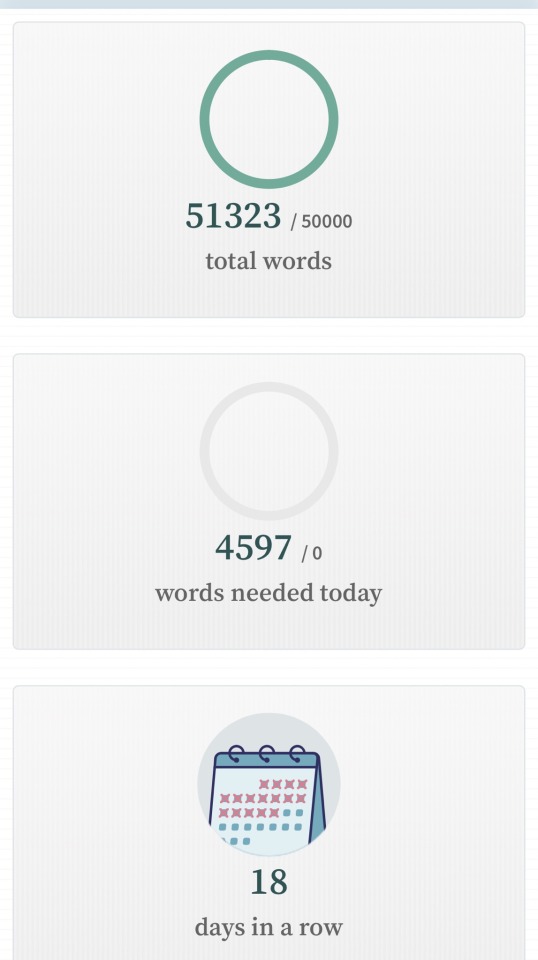

Over 51,000 words in 18 days… that’s a new personal record!
#I beat my goal and I am extremely proud of myself#but we don’t stop here#I wonder if I can finish the draft this month#honestly I have a fantastic outline. I could just follow it til the end of the month and see what happens.#camp nano#nanowrimo#my writing#lore series#lore book 1
27 notes
·
View notes
Text
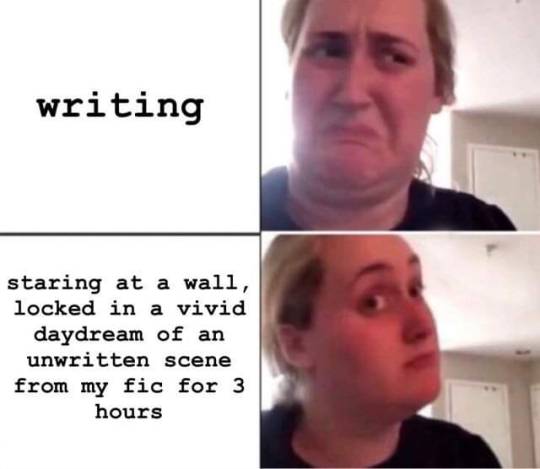
34K notes
·
View notes
Text
me, staring at the same blank document for 5+ hours: writing is my passion✨🔥🗣️🔥✨🔥🗣️
#nanowrimo is already kicking my ass and it’s only the first day 😭#this also applies to fic writing though#nanowrimo#nano 2023#jinx talks
5K notes
·
View notes
Text
*trembling, vibrating, clawing at the ground and foaming at the mouth, crawling and dragging my weak body across the ground* MUST. WRITE.
#writing#writeblr#writing memes#writer memes#writer problems#writers on tumblr#writers and poets#writerscommunity#writers block#writers#nanowrimo#nano 2023#asterrisks
3K notes
·
View notes
Text
i love writing. i also would rather be doing literally anything else
#NaNoWriMo#writing#shitpost#girl c’mon open your laptop put some words there#you don’t have to do it all in one sitting like yesterday#but you will if you don’t pull urself together and write enby#*write rn!!#it’s because I want to find this one page of notes im pretty sure is in my room somewhere#to see if it has details for the epilogue#but idk where it went!!!#i don’t think I’d get rid of it…? but i don’t know where else I would’ve put it#if it’s not the places I checked
4K notes
·
View notes
Text
#lets GO#promo tags ->#writing#creative writing#nanowrimo#nano 2023#booklr#fanfiction#fic writers#ao3
4K notes
·
View notes
Text
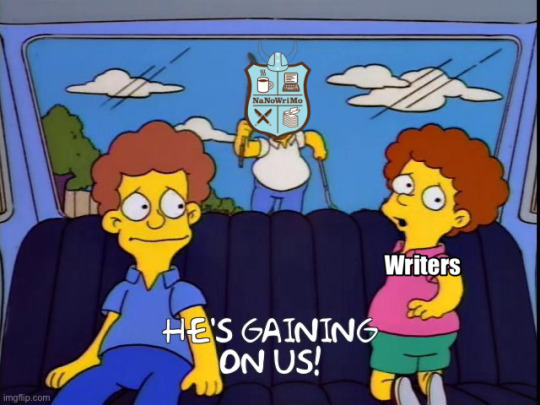
It’s that time of year again!
#writing#NaNoWriMo#nanowrimo 2023#nano#writeblr#writing meme#writers#writing community#meme#writing problems#writing memes#writer meme
4K notes
·
View notes
Text
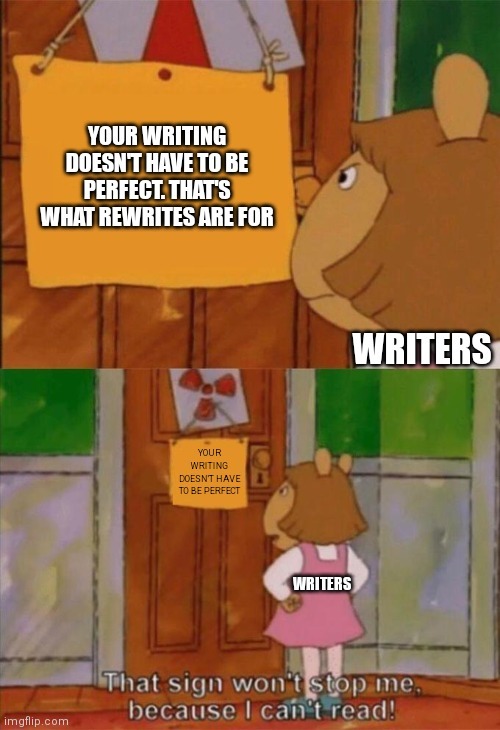
18K notes
·
View notes
Text
free resources to write a novel in 2024
hello hello! it's me, rach!
as the new year approaches, many of us set goals and resolutions - myself included. one of my goals for 2024 is to write a novel (I've been procrastinating on this for quite a long time now). i assume that some of you might have the same goal, that's why I'm writing this post today.
over 2023 i've been releasing some freebies for authors just like me, so I thought I could compile my favorites in this post. hope you find this useful :)
1) the writer's workbook
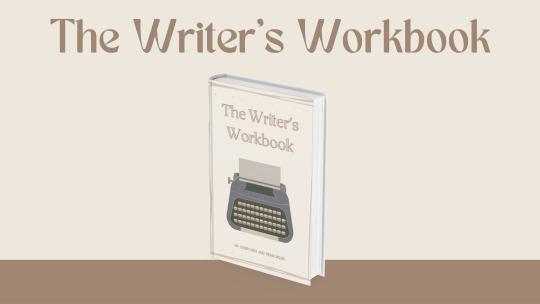
this workbook has over 60 exercises to help you develop characters, scenarios, etc. if you're ever stuck, I'm pretty sure this workbook will be your best friend.
2) author's corner (notion template)
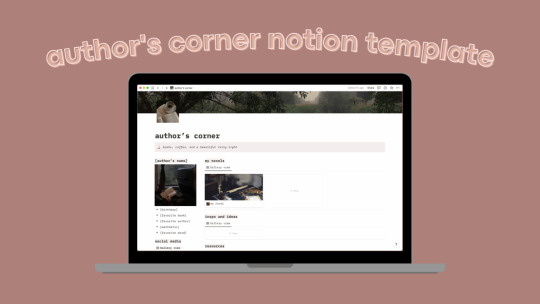
this is the most downloaded freebie in my shop! it is a notion dashboard with everything you need to organize your writing and has some templates included (like scrivener)!!
3) another notion template
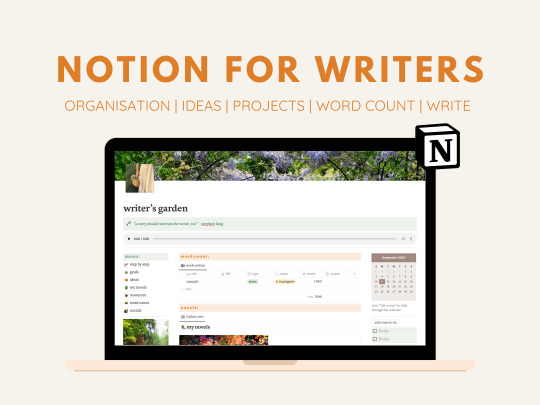
this one has two themes you can choose from: cottage-core and dark academia. they're very similar to the previous template, but this one is more recent and I added some new features. feel free to explore both and pick the one you like the most.
4) the author's journal
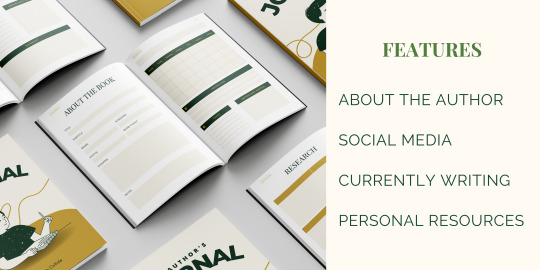
this is a cute printable with 20 pages that will help you stay on track and manage your social media accounts as a writer who shares their work online. you can also register what you're currently writing and your personal research and resources.
5) plan your book printable
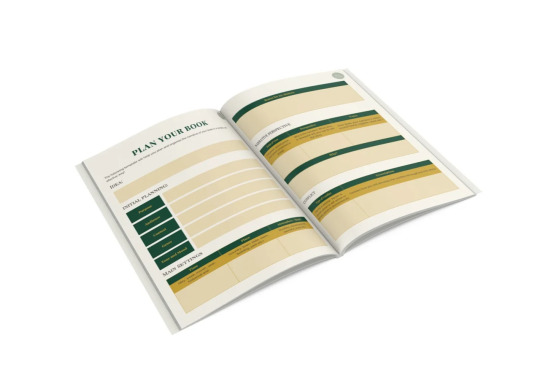
this is a 6-page printable for you to fill out and plan your book easily and effectively.
6) excel sheet to organize tasks & word-count

this is a simple excel sheet, but it is very effective for keeping track of your tasks & word-count of your novels. also, it is 100% customizable to your liking!
that's all for now! feel free to explore my gumroad shop where I have plenty of freebies to grab! also, don't forget to subscribe so that you never miss any opportunity to get a goodie for free :)
hope this post was useful!
have a nice day,
rach
#writing resources#writing#writeblr#writer tips#writing advice#writing help#writing tips#poetsandwriters#resources#research#wattpad#nanowrimo#creative writing#writerscommunity#writers#writing inspiration#writing prompts#writing reference#writerslife#writersofinstagram#software#inspiration#writing inspo#for writing#for writers#for whoever needs it#writing research#researching#we love an useful post#useful
3K notes
·
View notes
Text
I could never write on my phone, but for some reason that changed this year and my word counts exploded, so it got me thinking about how everyone else is doing this.
Will be reading tags/replies in case you say how it's affected your word counts!
2K notes
·
View notes
Text
I've been writing for a while so I thought I'd share some writing tips I've learned along the way.
1. Never sacrifice the flow for a quirky line.
That bit of dialogue or flowery paragraph you really like but it kinda disrupts the flow? Scrap it. I know it hurts, but you need to. If you really want to keep it, find somewhere else to put it where it actually fits in.
2. Dialogue is a dance.
Dialogue should go at the pace of an actual conversation, back and forth with little breaks and pauses. Add as little dialogue tags as possible while still making it clear who is speaking. You can also describe what is happening during a pause in the conversation rather than saying they paused, unless the pause is important.
3. Show don't tell is a guideline, not a rule.
Show don't tell is a very useful guideline, but if you're ALWAYS showing it can get exhausting to read. Skip the boring bits and just tell us what happened, then we can get to the good stuff.
4. If it's boring to write, it's probably boring to read.
If you can cut out a whole scene with little consequence to the story, you probably should. As I said before, you don't always have to show us, you can always tell us.
5. Everything needs to have a purpose.
I know there are probably lots of interesting or cute scenes where your characters are just fucking around, but if it doesn't develop character, relations, conflict, or plot, why should we care? Definitely still write them if they make you happy, but if you're gonna add it to your final draft, make sure it matters.
6. You don't need to explain everything all at once.
I know it feels tempting to put all the lore, and all the character's intentions, and reasonings into the first few chapters, but please refrain, you can reserve that for your character and worldbuilding sheets. Instead, take the time to let us get to know the characters, and the world, in the same way we'd get to know a real person. Make your exposition as seamless and natural as possible. It will take practice to know when to reveal information and when to let us wonder, but you'll get there.
7. Write in a way that comes naturally.
I know you probably have an author you wanna write just like, but that is unlikely to happen. Embrace your natural writing style and perfect it, rather than trying to be something you're not. Writing is an art, you need to find your own style and polish it as best you can.
8. Try to make us feel connected by cutting out certain words like "felt".
"Chad felt like a glass of water." Can be replaced with, "Chad was thirsty, so he reached for a glass of water." Both sentences tell us Chad wants a glass of water, but one makes us feel more connected to Chad than the other. Though both sentences have their time and place, you want to make your audience feel as close to their protagonist as possible. Make them feel like they're there, rather than just an onlooker.
9. We don't need to know every physical detail of your character.
I know you probably spent ages creating the perfect characters and you want to give us the perfect image of what they look like, but it can get monotonous and boring, why do we care that your character has brown eyes unless the colour has some sort of significance? Try to list off only the most notable features of your character and put focus only on the relevant details. Sometimes you can even not describe them at all and throw in little bits of information about their appearance for the audience to put together. We read to imagine, not to have a perfect image painted for us when we could be getting to the plot.
10. You're allowed to be vague.
Allow your audience to assume things, with some things you can just be lazy and let your audience's imagination do the work for you. Of course, don't do this with important things, but you can save so much time you might've spent researching an irrelevant topic when you can just be vague about it. You don't have to know everything you're writing about, so long as you know the bits that matter.
11. Writing is a skill that takes practice.
Don't be so hard on yourself if your writing is a bit cringe, we've all been there. The important part is that you research how to get better and keep writing those super cringe chapters. One day you'll reread something from a while ago and realize you're actually not as bad as you thought.
12. Leave your work to rest.
I know you wanna start editing right away, but once you've finished, leave it for at least a month. The longer you leave it the better, but that depends on your attention span. A month to six months is good if you're really impatient but want a good result. If you keep writing in that time your skills will continue to improve, then you'll be editing that draft with fresh eyes and fresh skills.
And if you're a fanfic author, I usually leave my chapters for a week before editing and posting.
Hope this helps anyone struggling, I thought this might be especially relevant now with nanowrimo.
I recently realized how much knowledge I've been accumulating over the years, I definitely have more but this is all I can think of for now.
I'm no writing guru, but if anyone has anything they're struggling with, I can do my best to help you out, so dont hesitate to ask questions.
2K notes
·
View notes
Text
4 Tips for Autistic Writers

Autistic writers can face unique challenges when it comes to writing. NaNo Participant Auden Halligan has tips to handle some of those challenges!
So, you’ve just sat down at your desk, all ready to work on your next chapter, but you just can’t seem to start. Something is itching at your brain, and no matter how hard you think, you can’t figure it out. For autistic writers, that itch might be even harder to get around when compounded with autistic inertia, introspection issues, and sensory processing disorder — even if we were super excited to get started, sometimes the stumbling blocks are enough to keep us from going anywhere at all.
Here are four tips to identify your struggles and work around them rather than against them as an autistic writer!
1. Schedule your writing time appropriately
While keeping a schedule can help you stave off unwanted change in your routine, the need to switch to another task when the clock strikes the hour sometimes feels like a monumental task, one that eventually becomes detrimental to your creative pursuits.
If switching tasks is the biggest hurdle to your writing, setting a designated writing time with no other plans around it could do the trick. Oftentimes, just one hour of time to transition from doing dishes to sitting down at your computer to write is exactly what you need to get past that point and find your writing headspace.
2. Make sure your sensory environment is right
Sometimes getting into that writing headspace is harder than normal, but you can’t put your finger on a reason. Chances are, you’re not quite ready until you have your sensory needs met and you can fully focus on your story.
Personally, I like to be on the couch with my water bottle, a playlist at just the right volume, and a comfortable jacket or hoodie on. For you, the ideal sensory space might involve a desk and a snack, a pet nearby, and a quiet room. For others, it could be outside or even at a library or coffee shop. Autistic people are all different and so are their sensory needs, so this one is super subjective — do what works best for you!
3. Take breaks often
Writing can be exhausting, and if you’re struggling to keep going, you might need to take a pause. If you’re like me and struggle with remembering to hydrate and eat once you’re deep in a task, use your break to get some water and a snack. If you’re having trouble staying focused, get up and move around and stim or go outside to give your brain a reset. If you feel like you’ve gotten some good progress done, however small, reward yourself — do something related to your special interest, dance with a pet, and celebrate your little (or big!) win!
The pomodoro method is a good way to keep yourself from working too long without a break, and if that doesn’t work for you, methods like the Eisenhower method with breaks interspersed and even simply inserting breaks into your scheduled writing time are just as valid.
4. Don’t be afraid to skip around
Another thing that often trips us autistic people up is needing to follow the story down its natural progression, from start to middle all the way to the finish. But inevitably, once we’ve gotten past the initial excitement of having the project started, we hit a stumbling block…and the project gets abandoned. I’ve left behind countless projects because I lost interest after hitting a scene I wasn’t excited for after just a few chapters.
To combat this, try writing out of order! Skip ahead to the scene directly after your stumbling block. You could also skip to the next scene your favorite character is in or even to the climax if it helps you move forward. If you’re having trouble putting your first words down, try writing a random scene in the middle of your story to get into the groove of writing your characters.
Alternately, if you can’t abide by the out of order method and really need to get your characters from Point A to Point B, try putting the scene you’re stuck on in brackets. For example:
[Character 1 and Character 2 fight over the decision to kick Character 3 off the team. 2 leaves in anger.]
It’s simple, efficient, and gets you out of that particular rut so you can keep moving toward that sweet, sweet conversation you’ve wanted to write since Day 1.
Now go forth and write, my friends!

Auden Halligan is a creator through and through. She’s been writing her entire life, but didn’t start participating in NaNoWriMo until 2017–right now she’s working on developing a TV series (or two!) and has several novels and short films in the drafting phase. Auden is currently a college student studying film production and hoping to minor in disability studies. You can find her on her very sparse Twitter at ink.and.spite.
Photo by Lisa Fotios from Pexels
If you’re an autistic writer, check out the Pillow Fort in the NaNoWriMo forums! It’s a group for people who are neurodivergent, have disabilities, mental health concerns, or physical challenges that affect their lives.
#nanowrimo#camp nanowrimo#writing#autistic writers#writing advice#by nano guest#Auden Halligan#neurodivergent writers
5K notes
·
View notes
Text
You are allowed to enjoy reading your own stories!
Every writer writes the story they want to tell, so don’t be afraid to read what you’re writing and just have fun. Not everything has to be in service of making your manuscript better.
It’s ok to enjoy yourself.
#nanowrimo#writers#creative writing#writing#writing community#writers of tumblr#creative writers#writing inspiration#writeblr#writerblr#writing tips#writers corner#writing advice#writing quick tips#advice for authors#writing pep talk#writers on tumblr#writers and poets#writers life#writer problems#on writing
3K notes
·
View notes
Text
I just rediscovered Cold Turkey Writer and it's changing my damn life. I've been using his internet blocker (Cold Turkey Blocker) for years, but somehow forgot that he has a distraction-free writing program, too. There's a free version, but I bought the Pro version for the extra features because it's only $9. (That's the one-time payment to own it forever, y'all - part of what makes this dude's stuff so cool is that he doesn't use the subscription model.) Also I just realized this sounds like an affiliate ad or something - it's not. I honestly just really love his software and think everyone should try it. Go get it for free and stop procrastinating!
2K notes
·
View notes
Text
Fantasy Guide to Creating Your Own Language

When writer's set out to world-build, language has a huge role in creating new cultures and lending a sense of realism to your efforts. A world and people just feel more real when language is involved. As the old Irish proverb says "tír gan teanga, tír gan anam”. A country without a language, is a country without a soul. So how can we create one?
Do Your Homework

First things off, you should start by studying languages. Nobody is asking you to get fluent but it's important to understand the basic mechanics of language. You will start to see certain tricks to language, how verbs are conjugated and how gender effects certain words. It will be easier to make up your own when you know these tricks. For example, in Irish one doesn't scold but "gives out to" - "a thabhairt amach". In German, numbers are arranged differently to the English with the smallest digit arranged before the tens for example 21 - Einsundzwanzig. By immersing yourself in an array of different languages (I recommend finding ones close to how you want your language to sound), you can gain the tools necessary for creating a believable language.
Keep it Simple

Nobody expects you to pull a Tolkien or channel the powers of David J. Peterson (hail bisa vala). You're not writing a dictionary of your con-lang. You will probably use only a handful of words in your story. Don't over complicate things. A reader will not be fluent in your con-lang and if they have to continually search for the meaning of words they will likely loose patience.
Start Small

When you're learning a language, you always start with the basics. You do the exact same when writing one. Start with introductions, the names of simple objects, simple verbs (to be, to do, to have for example) and most importantly your pronouns (you will use these more than any other word, which is why I always start with them). Simple everyday phrases should always be taken care of first. Build your foundation and work your way up, this is a marathon not a race.
Music to the Ears

If your creating a new language, you're more than likely doing it phonetically. Sound is important to language and especially a con-lang because you want to trick your reader into thinking of a real language when reading the words on the page. I suggest sitting down and actually speak your words aloud, get the feel of them on the tongue to work out the spelling. Spellings shouldn't be too complicated, as I said before the readers aren't fluent and you want to make it easier for them to try it out themselves.
Also when you're creating the con-lang, it's important to figure out how it sounds to an unsuspecting ear. If a character is walking down a street and hears a conversation in a strange language, they will likely describe to the reader what it sounds like. It might be guttural or soft, it might be bursque or flowery. It's always interesting to compare how different languages flow in the ear.
Writing in Your Language

Now that you've written your language and created some words, you will want to incoperate them into your story. The way most writers do this is by italicising them. As a reader, I generally prefer authors not to go too overboard with their con-lang. Swathes of con-lang words might intrigue a reader but it can leave them confused as well. It is better to feed con-lang to your readers bit by bit. In most published works writer's tend to use words here and there but there are few whole sentences. For example in A Game Of Thrones by George RR Martin, has actually only a handful of short sentences in Dothraki despite the language being prevalent throughout the book. Daenerys Targaryen pronounces that "Khalakka dothrae mr’anha!"/"A prince rides inside me!" and it's one of the only sentence we actually see in actual Dothraki.
There's also nothing stopping you from just saying a language has been spoken. If you're not comfortable writing out the words, then don't make yourself. A simple dialogue tag can do the trick just fine.
Know your Words

I do recommend keeping an actual record of your words. Make a dictionary if you want or a simple list of words you need. This is one of the most entertaining aspects of world building, have fun with it, go mad if you like. Also here's a short list of questions you can ask yourself about language in general which might help your juices flow.
#Fantasy Guide to Creating Your Own Language#Con-langs#Con langs#Writing a con lang#writing#writeblr#writing resources#writing reference#writing advice#ask answered questions#writing advice writing resources#writers#Writing advice writing reference#Writing reference writing advice#Writing rescources#Writing resource writing reference#Fantasy guide#Writing guide#Writing how to#nanowrimo
2K notes
·
View notes